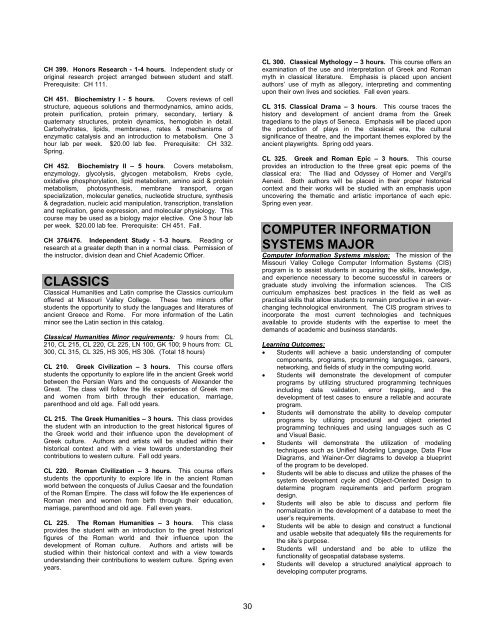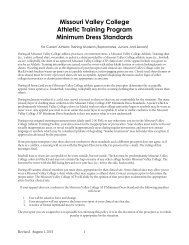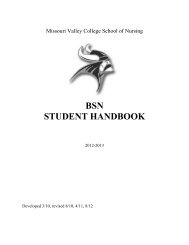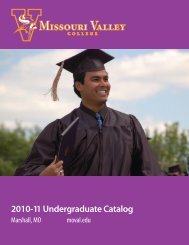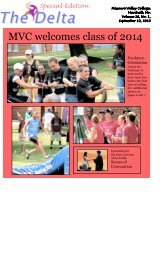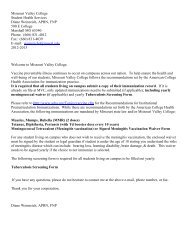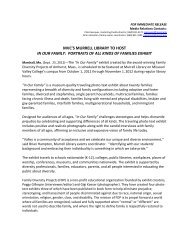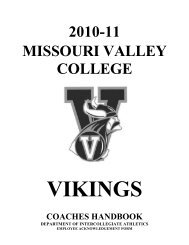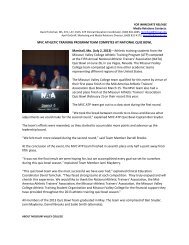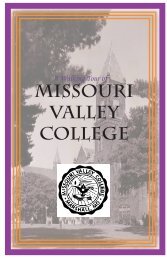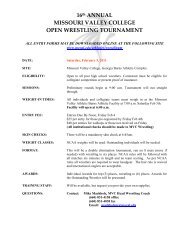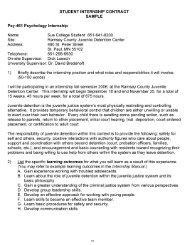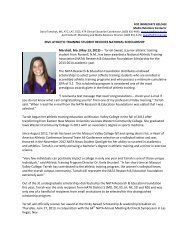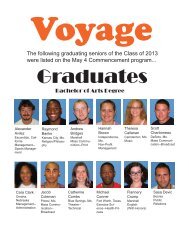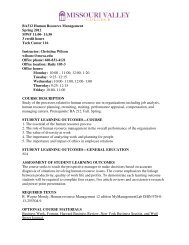2012-13 Undergraduate Catalog - Missouri Valley College
2012-13 Undergraduate Catalog - Missouri Valley College
2012-13 Undergraduate Catalog - Missouri Valley College
Create successful ePaper yourself
Turn your PDF publications into a flip-book with our unique Google optimized e-Paper software.
CH 399. Honors Research - 1-4 hours. Independent study or<br />
original research project arranged between student and staff.<br />
Prerequisite: CH 111.<br />
CH 451. Biochemistry I - 5 hours. Covers reviews of cell<br />
structure, aqueous solutions and thermodynamics, amino acids,<br />
protein purification, protein primary, secondary, tertiary &<br />
quaternary structures, protein dynamics, hemoglobin in detail.<br />
Carbohydrates, lipids, membranes, rates & mechanisms of<br />
enzymatic catalysis and an introduction to metabolism. One 3<br />
hour lab per week. $20.00 lab fee. Prerequisite: CH 332.<br />
Spring.<br />
CH 452. Biochemistry II – 5 hours. Covers metabolism,<br />
enzymology, glycolysis, glycogen metabolism, Krebs cycle,<br />
oxidative phosphorylation, lipid metabolism, amino acid & protein<br />
metabolism, photosynthesis, membrane transport, organ<br />
specialization, molecular genetics, nucleotide structure, synthesis<br />
& degradation, nucleic acid manipulation, transcription, translation<br />
and replication, gene expression, and molecular physiology. This<br />
course may be used as a biology major elective. One 3 hour lab<br />
per week. $20.00 lab fee. Prerequisite: CH 451. Fall.<br />
CH 376/476. Independent Study - 1-3 hours. Reading or<br />
research at a greater depth than in a normal class. Permission of<br />
the instructor, division dean and Chief Academic Officer.<br />
CLASSICS<br />
Classical Humanities and Latin comprise the Classics curriculum<br />
offered at <strong>Missouri</strong> <strong>Valley</strong> <strong>College</strong>. These two minors offer<br />
students the opportunity to study the languages and literatures of<br />
ancient Greece and Rome. For more information of the Latin<br />
minor see the Latin section in this catalog.<br />
Classical Humanities Minor requirements: 9 hours from: CL<br />
210, CL 215, CL 220, CL 225, LN 100, GK 100; 9 hours from: CL<br />
300, CL 315, CL 325, HS 305, HS 306. (Total 18 hours)<br />
CL 210. Greek Civilization – 3 hours. This course offers<br />
students the opportunity to explore life in the ancient Greek world<br />
between the Persian Wars and the conquests of Alexander the<br />
Great. The class will follow the life experiences of Greek men<br />
and women from birth through their education, marriage,<br />
parenthood and old age. Fall odd years.<br />
CL 215. The Greek Humanities – 3 hours. This class provides<br />
the student with an introduction to the great historical figures of<br />
the Greek world and their influence upon the development of<br />
Greek culture. Authors and artists will be studied within their<br />
historical context and with a view towards understanding their<br />
contributions to western culture. Fall odd years.<br />
CL 220. Roman Civilization – 3 hours. This course offers<br />
students the opportunity to explore life in the ancient Roman<br />
world between the conquests of Julius Caesar and the foundation<br />
of the Roman Empire. The class will follow the life experiences of<br />
Roman men and women from birth through their education,<br />
marriage, parenthood and old age. Fall even years.<br />
CL 225. The Roman Humanities – 3 hours. This class<br />
provides the student with an introduction to the great historical<br />
figures of the Roman world and their influence upon the<br />
development of Roman culture. Authors and artists will be<br />
studied within their historical context and with a view towards<br />
understanding their contributions to western culture. Spring even<br />
years.<br />
CL 300. Classical Mythology – 3 hours. This course offers an<br />
examination of the use and interpretation of Greek and Roman<br />
myth in classical literature. Emphasis is placed upon ancient<br />
authors’ use of myth as allegory, interpreting and commenting<br />
upon their own lives and societies. Fall even years.<br />
CL 315. Classical Drama – 3 hours. This course traces the<br />
history and development of ancient drama from the Greek<br />
tragedians to the plays of Seneca. Emphasis will be placed upon<br />
the production of plays in the classical era, the cultural<br />
significance of theatre, and the important themes explored by the<br />
ancient playwrights. Spring odd years.<br />
CL 325. Greek and Roman Epic – 3 hours. This course<br />
provides an introduction to the three great epic poems of the<br />
classical era: The Iliad and Odyssey of Homer and Vergil’s<br />
Aeneid. Both authors will be placed in their proper historical<br />
context and their works will be studied with an emphasis upon<br />
uncovering the thematic and artistic importance of each epic.<br />
Spring even year.<br />
COMPUTER INFORMATION<br />
SYSTEMS MAJOR<br />
Computer Information Systems mission: The mission of the<br />
<strong>Missouri</strong> <strong>Valley</strong> <strong>College</strong> Computer Information Systems (CIS)<br />
program is to assist students in acquiring the skills, knowledge,<br />
and experience necessary to become successful in careers or<br />
graduate study involving the information sciences. The CIS<br />
curriculum emphasizes best practices in the field as well as<br />
practical skills that allow students to remain productive in an everchanging<br />
technological environment. The CIS program strives to<br />
incorporate the most current technologies and techniques<br />
available to provide students with the expertise to meet the<br />
demands of academic and business standards.<br />
Learning Outcomes:<br />
Students will achieve a basic understanding of computer<br />
components, programs, programming languages, careers,<br />
networking, and fields of study in the computing world.<br />
Students will demonstrate the development of computer<br />
programs by utilizing structured programming techniques<br />
including data validation, error trapping, and the<br />
development of test cases to ensure a reliable and accurate<br />
program.<br />
Students will demonstrate the ability to develop computer<br />
programs by utilizing procedural and object oriented<br />
programming techniques and using languages such as C<br />
and Visual Basic.<br />
Students will demonstrate the utilization of modeling<br />
techniques such as Unified Modeling Language, Data Flow<br />
Diagrams, and Wainer-Orr diagrams to develop a blueprint<br />
of the program to be developed.<br />
Students will be able to discuss and utilize the phases of the<br />
system development cycle and Object-Oriented Design to<br />
determine program requirements and perform program<br />
design.<br />
Students will also be able to discuss and perform file<br />
normalization in the development of a database to meet the<br />
user’s requirements.<br />
Students will be able to design and construct a functional<br />
and usable website that adequately fills the requirements for<br />
the site’s purpose.<br />
Students will understand and be able to utilize the<br />
functionality of geospatial database systems.<br />
Students will develop a structured analytical approach to<br />
developing computer programs.<br />
30


